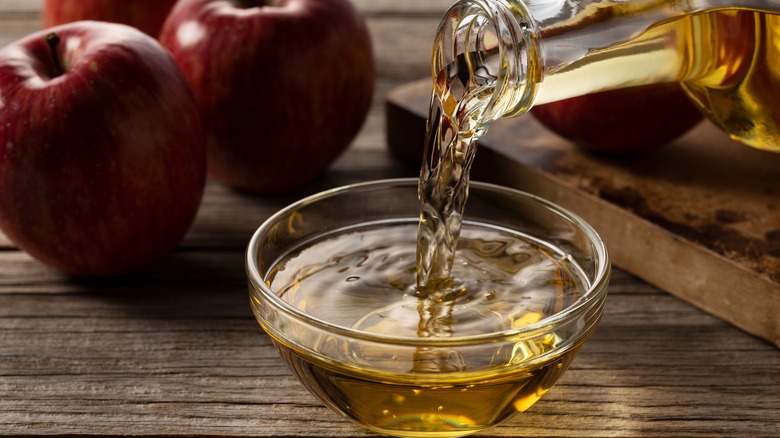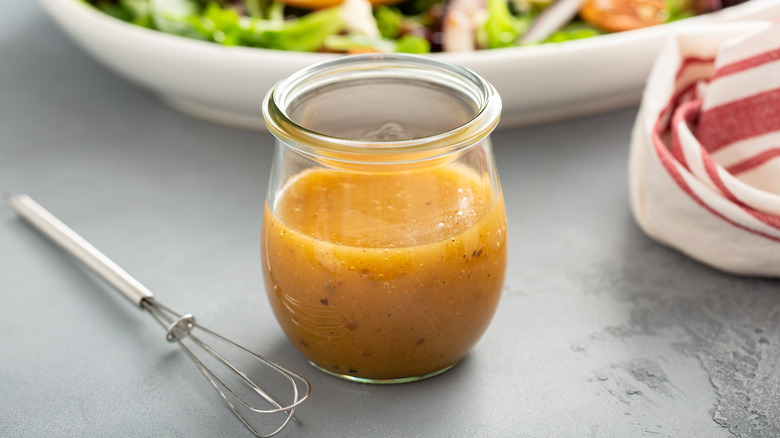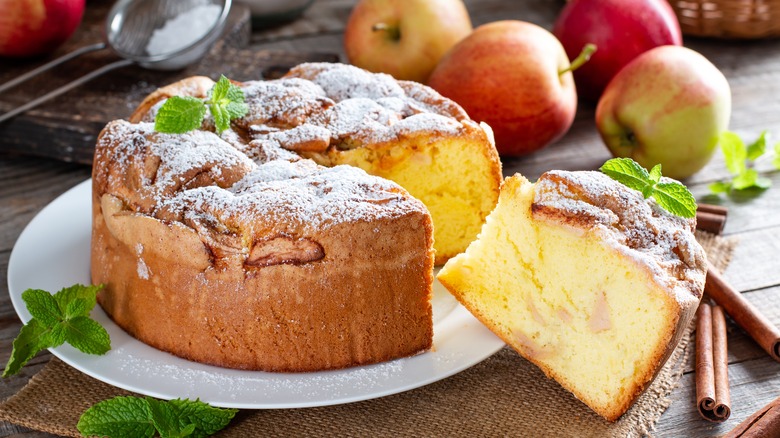The Best Substitute For Apple Juice
Apple juice, in addition to being a deliciously refreshing drink served cold or as a steamy mulled apple cider with warm spices, is an excellent and versatile ingredient for every home cook. The juice, with its balance of natural sweetness and subtle tartness, is perfect when whisked into a salad dressing to complement earthy greens or when used as a marinade for a variety of meats. However, if you don't have apple juice on hand and your recipe calls for it, there's a simple and equally satisfying substitute you can turn to: apple cider vinegar.
Apple cider vinegar, which is apple juice that has been fermented with yeast to make a concentrated mouth-puckering condiment, retains its apple-y flavor, while being an extremely shelf-stable ingredient you can keep in your pantry for months at a time — perfect for occasions like when you run out of apple juice in the fridge. To sub apple cider vinegar into a recipe, however, it's helpful to make adjustments based on the cooking application (for instance, sweet vs. savory dishes), since apple cider vinegar's taste can be quite pungent. If called for in large quantities, you'll want to dilute it so it doesn't overpower your recipe.
How to swap in apple cider vinegar
To substitute apple cider vinegar for apple juice, the amount will depend on the recipe. This simple swap works for most savory applications, including an apple vinaigrette or apple soy pork marinade. If your vinaigrette calls for 2 tablespoons of apple juice, simply cut the amount in half, and add in 1 tablespoon of apple cider vinegar. For a marinade that uses a half cup of apple juice, however, you can dilute your apple cider vinegar in water since half a cup of vinegar would be pretty unpalatable. To water your apple cider vinegar down, just dilute a tablespoon of vinegar for every cup of water and add a teaspoon of sugar or honey to the mix to mimic some of the sweetness of apple juice. Whisk the mixture together, then continue with your recipe, adding soy sauce, herbs, and any other ingredients.
For baking, subbing juice for apple cider vinegar can be a bit more nuanced. Here, the same rules can apply: If you just need a teaspoon or two in a recipe, swap in half the amount of apple cider vinegar. Dilute vinegar down in cake and muffin batters to provide adequate moisture. However, it's worth noting that something like an apple pound cake or breakfast loaf just won't turn out the same with this substitution. For bakes that aim to feature a fresh apple taste, in a pinch, it's better to reach for another fruit juice instead.
For sweet recipes, opt for another fruit juice or apple sauce
While apple cider vinegar is a sure-fire substitute for apple juice in most cooking situations, there are exceptions. When you're baking something with the intent to be extra fruit juicy in flavor and texture, like with a homemade apple pound cake, you can simply swap apple juice for another fruit juice stocked in the fridge or pantry, or use apple sauce if you have it on hand. Other autumnal fruits like pear juice work extremely well too, and can even add an unexpected creative flavor twist while being an easy substitution.
White grape juice (since many white grape juices have apple juice as their first ingredient) or pineapple juice also work well to replace apple juice in a variety of baking recipes. When making a sweet smoothie, or other applications where the tartness of vinegar won't do, you could also throw in some orange juice. However, apple cider vinegar is commonly added in small amounts to make healthy drinks, along with other beneficial ingredients like turmeric, so you could always adjust your smoothie recipe and add it in. When using apple cider vinegar or other fruit juices in lieu of apple juice, the most important thing is to tap into your culinary senses, experiment, and embrace the inventive solutions that come with the ingredient swap.


